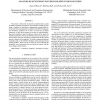Free Online Productivity Tools
i2Speak
i2Symbol
i2OCR
iTex2Img
iWeb2Print
iWeb2Shot
i2Type
iPdf2Split
iPdf2Merge
i2Bopomofo
i2Arabic
i2Style
i2Image
i2PDF
iLatex2Rtf
Sci2ools
109
click to vote
ICASSP
2008
IEEE
2008
IEEE
Analysis-by-synthesis features for speech recognition
We present a framework for speech recognition that accounts for hidden articulatory information. We model the articulatory space using a codebook of articulatory configurations geometrically derived from EMA measurements available in the MOCHA database. The articulatory parameter set we derive is in the form of Maeda parameters. In turn, these parameters are used in a physiologicallymotivated articulatory speech synthesizer based on the model by Sondhi and Schroeter. We use the distortion between the speech synthesized from each of the articulatory configurations and the original speech as features for recognition. We setup a segmented phoneme recognition task on the MOCHA database using Gaussian mixture models (GMMs). Improvements are achieved when combining the probability scores generated using the distortion features with the scores using acoustic features.
Articulatory Configurations | Hidden Articulatory Information | ICASSP 2008 | Physiologicallymotivated Articulatory Speech | Signal Processing |
Related Content
| Added | 30 May 2010 |
| Updated | 30 May 2010 |
| Type | Conference |
| Year | 2008 |
| Where | ICASSP |
| Authors | Ziad Al Bawab, Bhiksha Raj, Richard M. Stern |
Comments (0)

